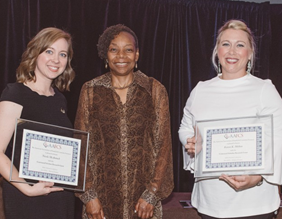
Alexandria, Va. – August 23, 2018 – Karen K. Melton and Nicole McAninch, both of Baylor University, were honored with the AAFCS Centennial Scholars Research Grant at the recent American Association of Family & Consumer Sciences (AAFCS) 109th Annual Conference & Expo in Atlanta, Ga.
In honor of the association’s 100th anniversary, the AAFCS Centennial Scholars Research Grant was created to fund research that will be shared with AAFCS members and used to promote the AAFCS mission. In order for members to carry out the mission of AAFCS, a scientific basis for practice is critical. Stimulating new and needed research advances the application of family and consumer sciences concepts and the study of the profession itself. The fund that supports the Centennial Scholars Research Grant was established in 2008, thanks to challenge grants given by AAFCS Past Presidents Peggy Meszaros and Sharon Nickols.
Melton and McAninch’s research centers around the intentional family method of living. This method describes a family that sets goals based on their family values, plans for resource usage based on these goals, and then implements that plan effectively. No empirical research has evaluated the effectiveness of the intentional family method of living; thus, a critical need exists to determine outcomes associated with intentional families. The purpose of Melton and McAninch’s proposed study is to determine if families utilizing an intentional method of living have a higher quality of life than families using other methods of living. This study will use data collected from a larger intentional family project, which includes 900 married and cohabitating individuals across the family life cycle. Melton and McAninch plan to use the grant to collaborate with a statistician to identify current trends of intentional family methods of living across the family life cycle and determine the extent to which these trends are associated with quality of life. Findings will advance the scholarship on intentional methods of family living as mechanisms for improving quality of life, and the findings will be utilized in developing evidence-based curriculum.
About the American Association of Family & Consumer Sciences (AAFCS)
Based in the Washington, D.C., area, AAFCS is the only association for family and consumer sciences students and professionals across multiple practice settings and content areas. For more than 100 years, AAFCS has focused its mission on providing leadership and support for professionals whose work assists individuals, families, and communities in making more informed decisions about their well-being, relationships, and resources to achieve optimal quality of life. AAFCS members provide research-based knowledge about the topics of everyday life to help create healthy and sustainable families. These topics include human development, personal and family finance, housing and interior design, food science, nutrition and wellness, textiles and apparel, and consumer issues. AAFCS members are located nationwide, and include educators, administrators and managers, human service and business professionals, researchers, community volunteers, and consultants who develop research-based information and deliver programs on essential skills to help individuals and families be better prepared to live, work, and succeed in today’s complex and diverse world.
Field of Family & Consumer Sciences
Family and consumer sciences (FCS) draws from broad and diverse disciplines to develop and provide content and programs that help individuals become more effective critical thinkers and problem solvers. Through discovery and delivery of research-based knowledge, FCS professionals help individuals and families develop essential skills to successfully live and work in a complex world. Professionals in the field are uniquely qualified to speak on many critical issues affecting individuals and families, such as maintaining a healthy lifestyle, wisely managing personal and family finances, and creating supportive relationships with family members, friends, and co-workers. They are located nationwide in a variety of practice settings, including secondary schools, universities, government agencies, and businesses.
For more information, please contact:
Gwynn Mason
Sr. Director, Communications & Marketing, AAFCS
703-706-4613
gmason@aafcs.org
###